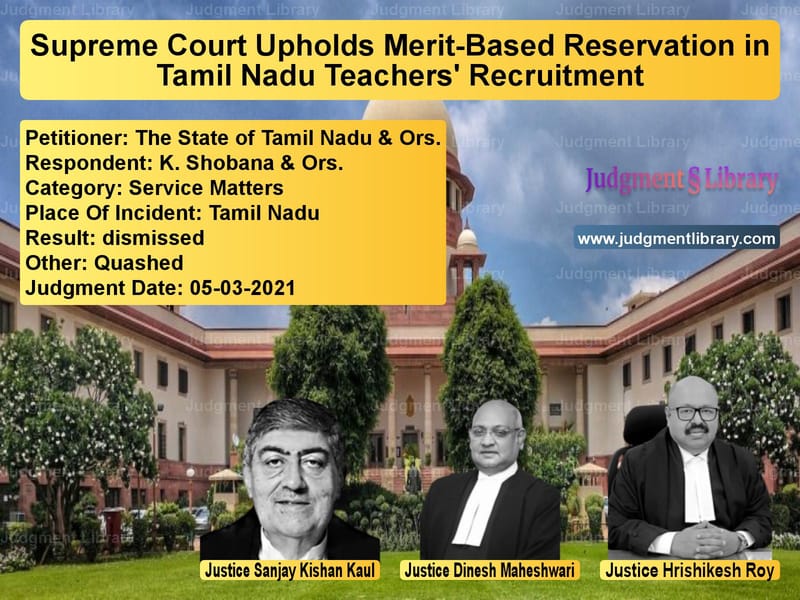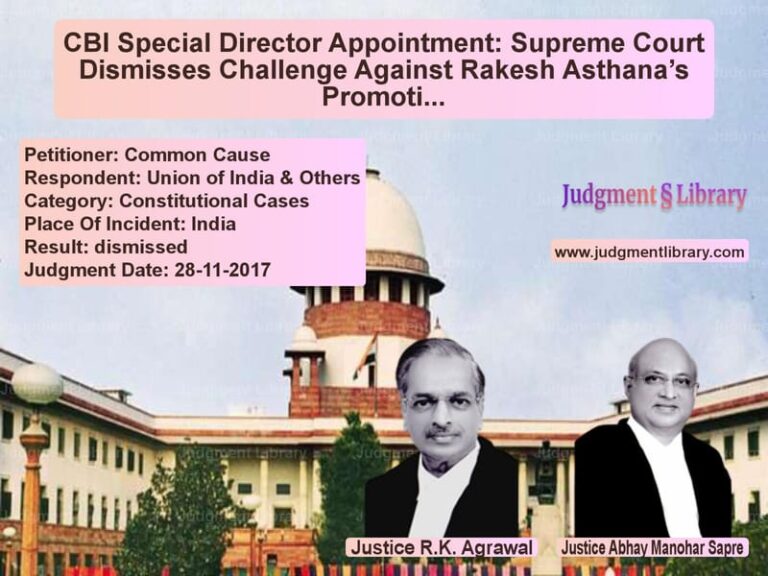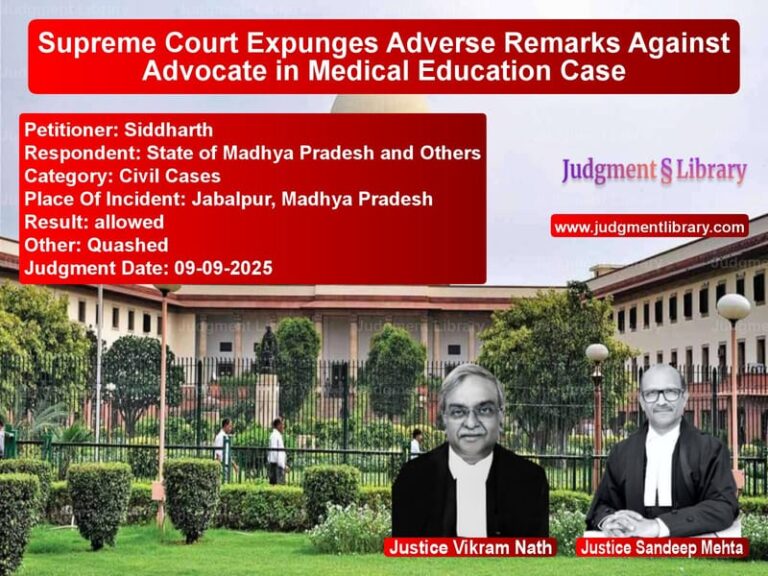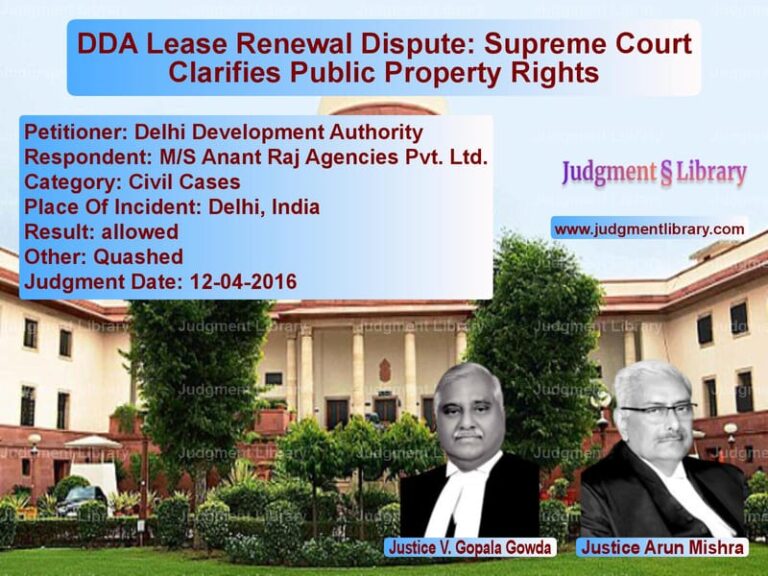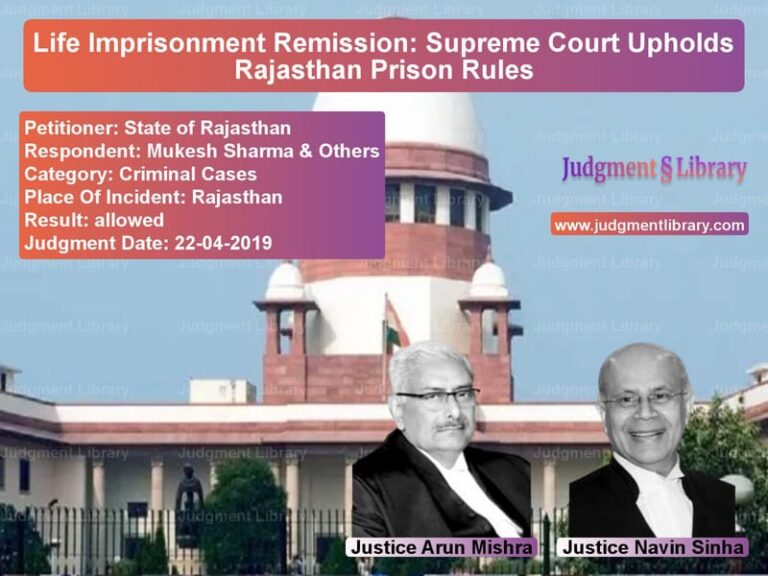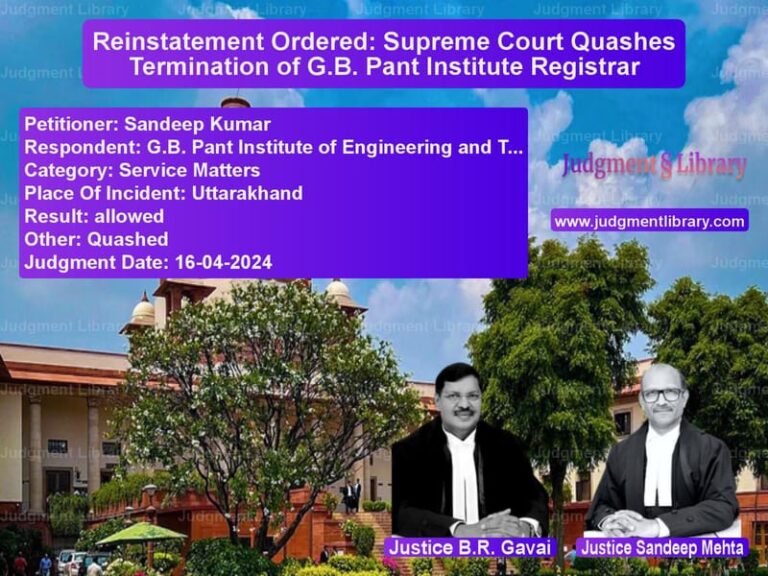Supreme Court Upholds Merit-Based Reservation in Tamil Nadu Teachers’ Recruitment
The Supreme Court of India recently delivered a landmark judgment in the case of The State of Tamil Nadu & Ors. v. K. Shobana & Ors., addressing the application of reservation policies in the recruitment of Post Graduate Assistants in Tamil Nadu. The ruling clarified the correct interpretation of backlog vacancies and merit-based selections, ensuring fair and transparent hiring practices.
Background of the Case
On 12.06.2019, the Tamil Nadu Teachers’ Recruitment Board issued a notification inviting applications for direct recruitment of Post Graduate Assistants and Physical Education Directors, Grade-I. The total number of vacancies for Chemistry teachers was 356, of which 117 were allocated for candidates belonging to the Most Backward Class (MBC) and Denotified Communities (DNC). This quota consisted of 74 backlog vacancies and 43 current vacancies.
Read also: https://judgmentlibrary.com/supreme-court-orders-fresh-review-in-upsc-ias-promotion-case/
The respondents appeared for the examination conducted on 28.09.2019. However, when the provisional selection list was published on 20.11.2019, their names were absent. The respondents scrutinized the list and discovered that meritorious MBC candidates had been counted against the reserved category backlog vacancies instead of being selected under the General Turn (open category). This allocation denied the respondents an opportunity for appointment.
The dispute led to the filing of writ petitions in the Madras High Court, seeking to quash the selection list and correct the method of appointment.
Petitioners’ Arguments (State of Tamil Nadu)
The State of Tamil Nadu, represented by senior counsel, argued:
- The Tamil Nadu Government Servants (Conditions of Service) Act, 2016, particularly Section 27(f), mandated filling up of backlog vacancies first.
- As per the law, backlog vacancies had to be filled first, even before considering General Turn (open category) candidates.
- Adjusting meritorious MBC candidates under the General Turn instead of backlog vacancies would reduce the reserved quota below the prescribed 69% reservation limit in Tamil Nadu.
- All the selection processes adhered to the applicable reservation policies and should not be altered.
Respondents’ Arguments (K. Shobana & Others)
The respondents, who were applicants for the Chemistry teacher post, countered:
- The State misapplied Section 27(f) by filling backlog vacancies with meritorious MBC candidates instead of placing them in the General Turn.
- Reservation should be applied only after merit-based selection has been conducted.
- By wrongly allocating meritorious candidates to the backlog, the State denied opportunities to other MBC candidates who could have been appointed.
- The correct process should be:
- First, fill open category seats with meritorious candidates, regardless of caste.
- Then, fill backlog vacancies using the reserved category candidates.
- Finally, allocate the remaining reserved category seats.
Supreme Court’s Observations
A three-judge bench of the Supreme Court, comprising Justices Sanjay Kishan Kaul, Dinesh Maheshwari, and Hrishikesh Roy, analyzed the reservation law and judicial precedents before delivering its ruling.
1. Merit-Based Selection Must Come First
“Candidates securing high marks should be placed in the General Turn first before applying the reserved category quotas.”
The Court reaffirmed that reservation does not override merit and that meritorious reserved category candidates should be placed in the General Turn before filling backlog vacancies.
2. Correct Interpretation of Section 27(f)
“Section 27(f) applies only after the merit-based selection is complete. The backlog vacancies must be filled after placing meritorious candidates in the General Turn.”
The Court clarified that the government misinterpreted the word “first” in Section 27(f) and emphasized that reservation only applies after merit-based selections.
3. Principle of Non-Derogation of Merit
“Candidates who secure marks within the General Turn cut-off cannot be adjusted under the backlog category, as it distorts the fairness of the selection process.”
The Court ruled that placing highly meritorious candidates in the backlog quota denied opportunities to other reserved category applicants.
4. Application of Constitutional Precedents
“The principle set forth in R.K. Sabharwal v. State of Punjab (1995) must be followed—reserved category candidates qualifying on merit must be placed in the open category first.”
The Court relied on established precedents to ensure that merit is not compromised by incorrect quota implementation.
Supreme Court’s Verdict
The Court ruled as follows:
- The State of Tamil Nadu wrongly applied reservation policies by counting meritorious MBC candidates in the backlog quota instead of the General Turn.
- The High Court’s ruling in favor of the respondents was upheld.
- The selection list was quashed, and the recruitment process had to be revised accordingly.
- The appellants (State of Tamil Nadu) were directed to implement merit-based selection before applying reservation policies.
Impact of the Judgment
This judgment has significant implications:
- Reaffirms the importance of merit-based recruitment in government jobs.
- Prevents the misapplication of reservation laws that could deny fair opportunities to qualified candidates.
- Ensures that backlog vacancies are filled after general merit seats are allocated.
- Sets a clear precedent for future recruitment processes in Tamil Nadu and across India.
Conclusion
The Supreme Court’s decision in this case reinforces the principle that reservation policies must not undermine merit. By ensuring that high-scoring candidates are placed in the General Turn first, the judgment protects fair competition while upholding the rights of reserved category candidates. The ruling is expected to serve as a guiding precedent for future government recruitment processes, ensuring that reservation benefits are applied correctly and equitably.
Petitioner Name: The State of Tamil Nadu & Ors..Respondent Name: K. Shobana & Ors..Judgment By: Justice Sanjay Kishan Kaul, Justice Dinesh Maheshwari, Justice Hrishikesh Roy.Place Of Incident: Tamil Nadu.Judgment Date: 05-03-2021.
Don’t miss out on the full details! Download the complete judgment in PDF format below and gain valuable insights instantly!
Download Judgment: the-state-of-tamil-n-vs-k.-shobana-&-ors.-supreme-court-of-india-judgment-dated-05-03-2021.pdf
Directly Download Judgment: Directly download this Judgment
See all petitions in Recruitment Policies
See all petitions in Public Sector Employees
See all petitions in Promotion Cases
See all petitions in Judgment by Sanjay Kishan Kaul
See all petitions in Judgment by Dinesh Maheshwari
See all petitions in Judgment by Hrishikesh Roy
See all petitions in dismissed
See all petitions in Quashed
See all petitions in supreme court of India judgments March 2021
See all petitions in 2021 judgments
See all posts in Service Matters Category
See all allowed petitions in Service Matters Category
See all Dismissed petitions in Service Matters Category
See all partially allowed petitions in Service Matters Category

